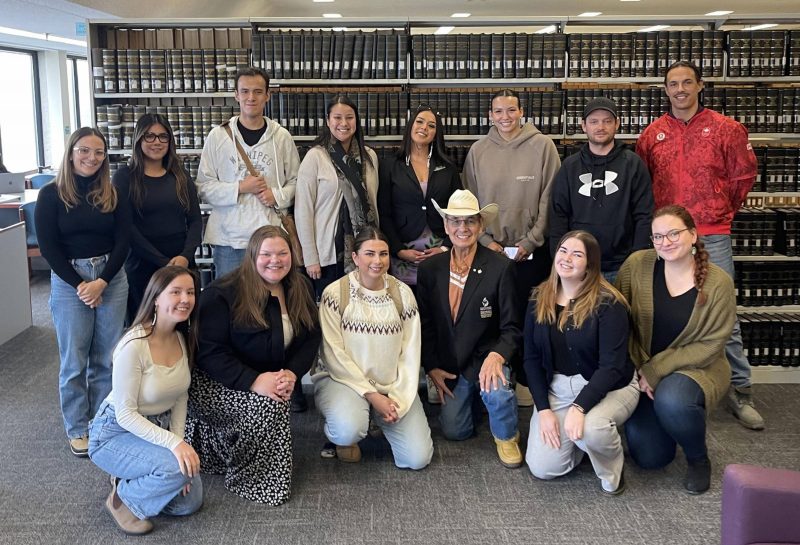
Members of the Manitoba Indigenous Law Students’ Association met with Wilton Littlechild, CC; KC; IPC; FP; BA, MA, LLB(Alta); LLD(Alta)(Leth)(Man) who came to UM to speak to law students at Robson Hall.
Learning with Chief Wilton Littlechild
Renowned Indigenous Rights lawyer visits Robson Hall
On Friday, December 6, 2024, members of the Manitoba Indigenous Law Students’ Association assembled for their monthly meeting with Indigenous faculty members but this time they were joined by a very special guest: Chief Wilton Littlechild, CC; KC; IPC; FP; BA, MA, LLB(Alta); LLD(Alta)(Leth)(Man). The renowned Treaty 6 lawyer, politician, athlete, Cree chief, and advocate for Indigenous rights had come to speak at the law school’s Indigenous Legal Methodologies and Perspectives class and also spend some quality time with MILSA members.
Littlechild’s visit came about due to earlier connections he had with Manitoba law students. Two Youth Chiefs of the Southern Chiefs Organization, Tréchelle Bunn (2L) and Josh Gandier (2L), had met and worked with him in the summer of 2024 at the 17th Session of the Expert Mechanism on the United Nations Declaration on the Rights of Indigenous Peoples in Geneva, Switzerland, and spent some time with him later at the Olympics in Paris. He was also the guest speaker at the Indigenous Bar Association conference this fall. Gandier knew Littlechild would be the perfect guest speaker for Robson Hall’s Indigenous Methodologies course and recommended him to his instructors, Assistant Professors Daniel Diamond, Leo Baskatawang, and Marc Kruse, Director of Indigenous Legal Learning and Services. The instructors especially asked Littlechild to speak to law students about Governance and his time at the UN.
Kruse had the opportunity to spend some time in private conversation with Littlechild while driving him from his hotel to Robson Hall. “I was particularly interested in his time in the UK where he brought the “Divisible Crown” case in 1981,” said Kruse.
The case, the full title for which is The Queen v The Secretary of State for Foreign and Commonwealth Affairs, ex parte Indian Association of Alberta,” was presided over by the legendary Lord Denning, and was monumental in Canadian Constitutional Law. It established that the Government of Canada was “a successor State to the British Crown” and therefore it, and not the Government of the United Kingdom was now responsible for upholding the treaties and obligations entered into by the Crown with Indigenous peoples in Canada.
“[Chief Littlechild] told me about spending months with Lord Denning, who heard the case and chose it as his final decision before his retirement,” said Kruse. “He spoke about the “suprise” of seeing the judiciary in the UK wigs and the differences in practice. He noted that the Nation had a few lawyers, where the Crown had over 25 legal counsel to argue their case. The case itself took several months and he was able to talk to the class about his experience.”
Importantly, before starting the class and upon arriving on campus, Gandier and Kruse offered a smudge to the Chief. “He told us, and the class, that he was thankful for the opportunity to have a smudge before speaking about Treaty,” Kruse noted. “He said, the Elders have always said that one must have smudge, and ask for permission and guidance, before speaking on Treaty so he was happy that Robson Hall offered him, and understood, the ILO [Indigenous Legal Orders] protocol.”
Kaitlyn Clarke (2L), who serves as MILSA VP Communications was one of the 15 members of the Manitoba Indigenous Law Students’ Association to join the noon-hour meeting prior to the class lecture where Littlechild noted that when he was in law school, there were only five Indigenous students in law school across Canada. Here, he was with over 15 in one law school alone. “He shared how sport took him to law school and joked about the grudge he used to have against the U of M because their hockey team went to the World University Games the year the U of A was supposed to attend, but the rules changed,” Clarke said.
Clarke recalled Littlechild’s teachings in the mandatory second-year Indigenous Methodologies class, where he spoke about Treaty 6, and shared what it means to his home, the Ermineskin Cree Nation: “He highlighted the four elements of the treaty: (1) written text, (2) oral testimony and the understanding in Cree, (3) sacred ceremony, and (4) the legal aspect – what courts have to say. He also emphasized that it is an international treaty, a sacred nation-nation and government-government agreement.”

Past and present members of MILSA present Chief Wilton Littlechild, with a Winnipeg Jets WASAC (Winnipeg Aboriginal Sports Achievement Centre) Jersey.
“My main takeaway from Chief Littlechild’s visit was a profound sense of gratitude—gratitude for the fierce advocates, like Chief Littlechild, who have dedicated their lives to fighting for Indigenous rights,” said Clarke, “When he attended law school, there were only five Indigenous students across Canada, and the Dean told him that being Indigenous was already a strike against him. Today, I am privileged to attend law school with at least 20 other Indigenous students in 2L at my school alone. I can sit in a room and listen to the powerful stories of an internationally respected Chief, personally welcomed and thanked by our Dean. It’s a humbling reminder of how far we’ve come and how fortunate I am to proudly share and celebrate my Métis identity—something my ancestors could not do.”
Janell Jackson (2L) had heard Littlechild speak in the past at various Assembly of First Nations events she attended as a young elected councillor for her community in 2015. “I was so excited when I was told that Dr. Littlechild would be visiting our final lecture for Indigenous Methodologies,” she said. “I had a very hard time understanding his talks back then [in 2015] because I was so young, and so new to the political landscape of Indigenous Relations. Now, after a year and a half of Law courses compiled with an undergrad, I finally comprehend the things he speaks about with the United Nations, Law, and Treaties. So, this was a very special time for me to listen, rather than engage. My appreciation and gratitude were through the roof.”
Jackson emphasized that Littlechild “understands the atrocities that have been imposed on Indigenous peoples, because he is a survivor. He has lived in a way that he represents Legal Order[s], advocates for Justice, while honouring his identity through the Colonial Systems.”
“I just wanted to express my gratitude to him, and tell him how important his role modelling and leadership have been for me on my journey when I began a tumultuous political life at such a young age,” she said, adding, “In case folks don’t know, he does the Land Acknowledgement for Hockey Games in Treaty 6!”
Recent graduate and past MILSA Executive Melinda Moch [JD/24] is an articling student at MLT Aikins, who took time out of her busy day to attend. “The chance to sit and listen to counsel from Chief Willie Littlechild was and is a lifetime opportunity. The life and experiences of an Indigenous trailblazer such as Chief Littlechild are not common. His contributions and positive impact on historical moments such as the implementation of UNDRIP and the founding of the North American Indigenous Games are simply incredible,” she said. “I asked Chief Littlechild about his involvement in one of his many historical accomplishments, that of being on the inaugural Board of Directors for the Canadian Museum for Human Rights. Chief Willie shared that the decision to place the Museum in its present home of Winnipeg, being the only Federal Museum to be housed outside of Ottawa, was one that honoured Winnipeg as a historical meeting place for Indigenous Nations dating back over 10,000 years.”
However, Moch said, “the biggest takeaway for me was Chief Willie’s investment in Indigenous youth. Despite constantly travelling the world engaging in international political matters, Chief Willie made space and time to travel to Manitoba to engage with and inspire Law Students at Robson Hall.”
Chief Wilton Littlechild will return to Winnipeg in January to help SCO host the United Nations’ Expert Mechanism on the Rights for Indigenous People (UN EMRIP).






